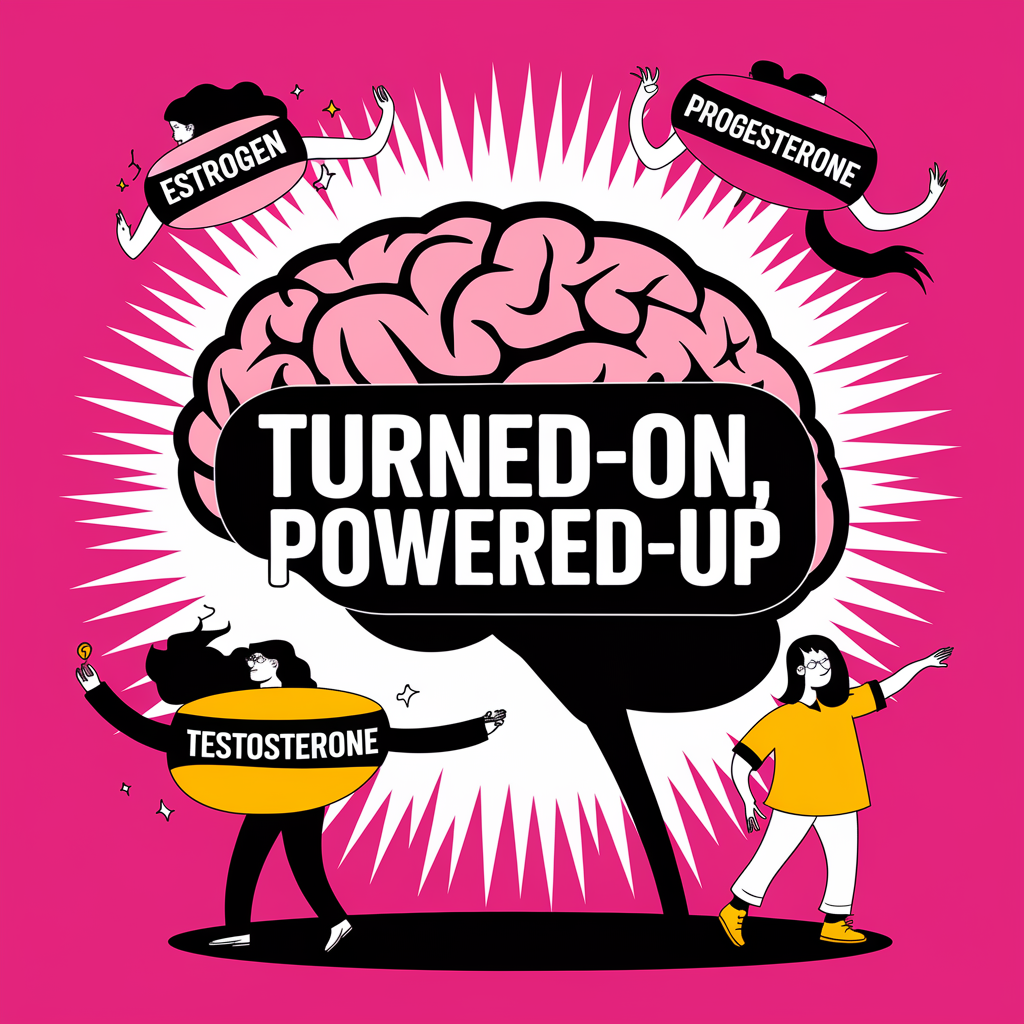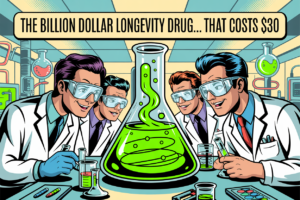“Where did I put my keys?” “What was I about to say?” “Why did I walk into this room?”
If you’re nodding your head in recognition, you’re experiencing one of the most under-discussed aspects of hormonal transition: cognitive changes. That mental cloudiness isn’t just annoying—it’s a legitimate neurophysiological response to shifting hormonal landscapes and one that deserves serious attention.
The Neuroendocrine Reality Behind Midlife Brain Fog
What many dismiss as “just getting older” actually represents profound neurobiological changes driven by hormonal fluctuations. Let’s examine the science of what’s happening in your brain:
Estrogen: Your Brain’s Multifaceted Neurotransmitter Modulator
Estrogen isn’t just a reproductive hormone—it’s a powerful neuromodulator that influences virtually every aspect of brain function:
- Neurotransmitter Production and Regulation: Estrogen upregulates the enzymes responsible for synthesizing acetylcholine (critical for memory formation), serotonin (mood regulation), and dopamine (motivation and reward systems).
- Synaptogenesis and Neural Plasticity: Research shows estrogen stimulates dendritic spine formation, with studies documenting up to a 30% increase in hippocampal synapses during high-estrogen phases. This directly impacts learning and memory formation.
- Cerebral Blood Flow and Glucose Metabolism: Estrogen increases brain perfusion by 15-20% and enhances glucose transport across the blood-brain barrier via GLUT4 transporters, ensuring optimal energy delivery to neurons.
- Neuroprotection: Estrogen reduces oxidative stress by upregulating antioxidant enzymes like superoxide dismutase and glutathione peroxidase by 40-60% in brain tissue.
When estrogen levels decline during perimenopause—often fluctuating dramatically before eventually decreasing by 65-80%—these neuroprotective and neuromodulatory functions diminish, manifesting as cognitive challenges many women experience.
Progesterone: The Calming Counterbalance
While estrogen often steals the spotlight, progesterone plays equally crucial roles in brain health:
- GABA Receptor Modulation: Progesterone and its metabolites (particularly allopregnanolone) are positive allosteric modulators of GABA-A receptors, enhancing inhibitory neurotransmission that promotes calm, focused thinking.
- Myelin Formation and Maintenance: Progesterone stimulates oligodendrocyte function, supporting the myelin sheaths that insulate neural connections and ensure efficient signal transmission.
- Reduced Excitotoxicity: Progesterone downregulates glutamate receptors, protecting neurons from excessive stimulation and potential damage.
- Anti-inflammatory Effects: Progesterone suppresses microglial activation and pro-inflammatory cytokine production in the brain, maintaining a healthier neural environment.
As progesterone levels decline or become erratic during perimenopause, this protective buffer diminishes, potentially manifesting as increased anxiety, sleep disturbances, and difficulty maintaining attention—all contributors to cognitive fog.
Testosterone: The Overlooked Cognitive Enhancer
Testosterone’s role in female cognitive health is frequently underappreciated:
- Executive Function Support: Women with higher testosterone levels within the normal female range demonstrate better performance on tasks involving spatial cognition, working memory, and executive planning.
- Motivation and Mental Energy: Testosterone influences dopaminergic pathways involved in drive, motivation, and mental stamina—all factors that combat cognitive fatigue.
- Amyloid-Beta Regulation: Testosterone may help regulate amyloid-beta protein metabolism, potentially reducing the risk of pathological protein accumulation associated with cognitive decline.
- Neural Resilience: Testosterone supports bdnf (Brain-Derived Neurotrophic Factor) expression, enhancing neural resilience and adaptability.
Women experience approximately a 50% reduction in testosterone from their 20s to menopause, with further declines post-menopause—another piece of the cognitive puzzle.
The Mitochondrial Connection: Powering Cognitive Function
Perhaps the most fascinating link between hormones and brain function lies at the mitochondrial level:
Estrogen receptors are present on mitochondrial membranes throughout the brain, directly influencing cellular energy production. When estrogen binds to these receptors, it:
- Increases ATP production by enhancing electron transport chain efficiency
- Upregulates mitochondrial biogenesis (creating new mitochondria)
- Reduces mitochondrial oxidative stress and membrane permeability
- Optimizes calcium handling, protecting against excitotoxicity
The brain, despite comprising only 2% of body weight, consumes approximately 20% of total body energy. This metabolic demand makes it particularly vulnerable to mitochondrial dysfunction. As estrogen levels decline, mitochondrial efficiency drops by 15-25% in brain tissue, creating an energy crisis at the cellular level that manifests as mental fatigue and cognitive cloudiness.
The Blood Sugar-Cognition Connection
Midlife hormonal changes create a perfect storm for glucose metabolism disruption that directly impacts cognitive function:
- Estrogen enhances insulin sensitivity and glucose uptake in the brain
- Declining estrogen leads to increased insulin resistance, affecting cerebral glucose metabolism
- This causes increased glucose variability, creating cycles of hyperglycemia and hypoglycemia
- The brain, which requires consistent glucose delivery, experiences energy fluctuations that compromise cognitive processing
These fluctuations are particularly pronounced in the prefrontal cortex and hippocampus—regions responsible for executive function and memory—explaining why focus, decision-making, and recall become challenging.
Studies using continuous glucose monitoring demonstrate that glucose variability correlates more strongly with cognitive symptoms than average glucose levels, suggesting stabilizing blood sugar may be a critical intervention for brain fog.
Evidence-Based Strategies for Restoring Cognitive Clarity
Hormonal Optimization Approaches
Hormone Therapy Considerations:
- Oral and transdermal bioidentical estradiol are both likely great options for keeping the brain powered-on, although most of the research thus far has been with oral estrogen formulations. Starting estrogen within 5-10 years of menopause onset offers more brain benefits than starting estrogen later.
- Progesterone (bioidentical) offers greater cognitive benefits than synthetic progestins, which may partially antagonize estrogen’s positive effects on cognition.
- Testosterone supplementation (when clinically indicated) may improve executive function, verbal memory, and mental energy in women with documented deficiency although more research is required to understand these relationships.
A landmark study published in Neurology found that women who initiated hormone therapy within five years of menopause onset had 30% less risk of Alzheimer’s disease compared to those who started later or never used hormones.
Nutritional Strategies for Neural Bioenergetics
Mitochondrial Support Compounds:
- Nicotinamide Riboside (NR): Precursor to NAD+, critical for mitochondrial function. Human studies show 300mg daily increases brain NAD+ levels by 40-50%.
- B-Vitamin Complex: B vitamins function as essential cofactors in cellular energy production and neurotransmitter synthesis. B12, B6, and folate are particularly crucial for methylation pathways that support cognitive function.
- Magnesium: ATP (cellular energy) exists primarily bound to magnesium. Supplementation has been shown to enhance synaptic plasticity and learning in multiple studies.
Neuroprotective Compounds:
- Fisetin: This flavonoid demonstrates remarkable senolytic properties (clearing senescent cells) and has been shown to enhance long-term potentiation in the hippocampus—a key mechanism for memory formation.
- Apigenin: Found in chamomile and parsley, apigenin modulates GABA receptors and exhibits neuroprotective effects through reduced oxidative damage and enhanced neuroplasticity.
- Spermidine: This naturally-occurring polyamine activates autophagy (cellular “housekeeping”) and has been associated with improved memory performance in both animal models and human studies.
Metabolic Optimization Strategies
Glucose Regulation Approaches:
- Dihydroberberine: This more bioavailable form of berberine activates AMPK, improving glucose utilization and reducing glycemic variability with fewer GI side effects than standard berberine.
- Trimethylglycine (TMG): Supports methylation pathways critical for neurotransmitter production and epigenetic regulation of genes involved in insulin signaling.
- Chromium: Enhances insulin receptor sensitivity, potentially improving glucose delivery to brain tissue.
Note: Many of the above ingredients are found in HOP Box, your “longevity stack in a pack,” which I formulated specifically for mid-life women. Check it out HERE.
Lifestyle Interventions with Significant Cognitive Impact
- Sleep Optimization: A single night of poor sleep increases amyloid-beta accumulation in the brain by 5-10% and reduces prefrontal cortex function. Prioritizing 7-8 hours of quality sleep is fundamental for cognitive recovery.
- Strategic Exercise: Aerobic activity increases BDNF levels by 32% on average, while resistance training improves executive function and memory. The optimal approach appears to be a combination of both modalities 3-5 times weekly.
- Stress Management Techniques: Chronic stress elevates cortisol, which antagonizes insulin and damages hippocampal neurons. Daily mindfulness practice (even just 10-15 minutes) has been shown to reduce cortisol by 15% and improve working memory.
- Cognitive Challenge: Learning new skills creates novel neural pathways through neuroplasticity. Studies show acquiring a new complex skill (like digital photography or a musical instrument) improves memory function more effectively than passive activities like puzzles.
Reframing Midlife Cognitive Changes
Perhaps most importantly, we need to shift our perspective on midlife cognitive changes. What you’re experiencing isn’t evidence of irreversible decline but rather a call for metabolic and hormonal recalibration. The brain remains remarkably plastic throughout life, capable of forming new connections and regenerating function when given the proper support.
The cognitive challenges of perimenopause and menopause are not inevitable consequences of aging but addressable neurophysiological responses to shifting hormonal environments. By understanding and addressing the core mechanisms—neurotransmitter modulation, mitochondrial function, and glucose metabolism—we can transform brain fog into brain power.
Your midlife brain isn’t “broken”—it’s adapting to a new hormonal landscape and requires appropriate support. With evidence-based interventions targeting the root causes of cognitive changes, many women report not just returning to their baseline but experiencing enhanced mental clarity and cognitive resilience.
Amy B. Killen, M.D. specializes in regenerative, metabolic, and hormonal medicine. Through her clinical practices, speaking engagements, and educational work, she helps women navigate their “Queen Phase” with forward-focused, integrative, evidence-based strategies that optimize vitality and well-being during hormonal transitions and beyond.
This information does not constitute medical advice. Discuss new supplements, medications, and lifestyle changes with your medical provider.












